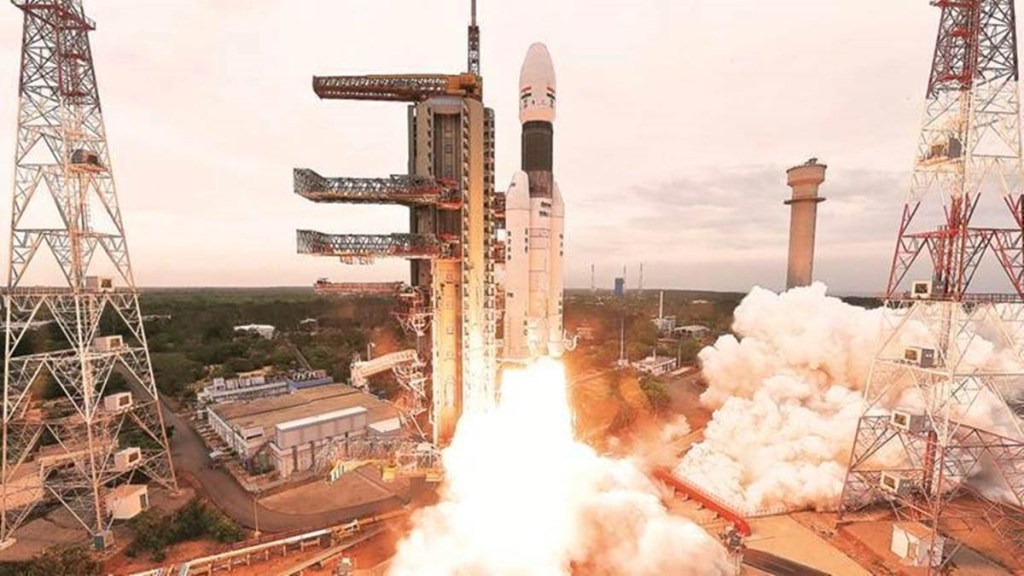By Girish Linganna
The launch of the Indian Space Research Organisation (ISRO) launcher LVM3 with satellites of the British company OneWeb is scheduled for October 23, 2022, reports PTI.
The launch will be carried out from the Satish Dhawan Space Center. The payload of the LVM3 rocket will include 36 satellites of the OneWeb constellation.
With this launch, OneWeb will have more than 70 per cent of its projected Gen 1 Low Earth orbit (LEO) network in orbit as it continues to offer high-speed, low-latency global connectivity services, the firm said in a press statement. This will be the fourteenth time the company has sent satellites into space.
ISRO has redesignated the GSLV-MkIII as the LVM-3 since the rocket will not place satellites in geosynchronous orbit but in Low Earth Orbit. The launch is part of two contracts with M/s Network Access Associated Limited (M/s OneWeb) to launch the satellites. A total of 72 satellites will be launched by ISRO in two missions.
OneWeb announced on September 20 that its most recent shipment of 36 broadband satellites had arrived in India ahead of schedule. The satellites travelled from their manufacturing plant in Florida to Chennai aboard an Antonov AN-124 operated by Antonov Airlines of Ukraine.
Until the beginning of 2022, the launches of satellites of this company were carried out by Russian carriers under a contract with Roscosmos. Russian rockets launched 428 satellites into orbit, and all missions were successful.
Events unfold after Russian – Ukraine war
OneWeb needs to launch 220 more satellites out of the 648 planned. It means 66 per cent of satellites have already been launched. Previously, the company delivered the satellites into orbit using Russian Soyuz rockets from the Baikonur Cosmodrome. However, on March 3, OneWeb announced the suspension of cooperation with Roscosmos.
The announcement came after Dmitry Rogozin, the chairman of the state company, outlined the launch conditions on March 2. _The first need was for full legal assurances that OneWeb would not utilise these satellites for military purposes and would not provide these services to the appropriate military agencies. The second requirement was that the British government withdraw from OneWeb’s stockholders.
Earlier that day, Roscosmos sought assurance from the French launch company Arianespace that OneWeb satellites would not be used for military purposes. Andrey Ionin, the Corresponding Member of the Russian Academy of Cosmonautics named after K.E. Tsiolkovsky, suggested the seizure of 36 OneWeb satellites that were brought to the Baikonur cosmodrome.
He offered to dismantle and inspect the company’s equipment. Owing to European and American sanctions placed on Roscosmos, it was previously revealed that OneWeb satellites would not receive stationary SPD-50M plasma engines from the Russian business Fakel.
Per the agreement with OneWeb, Roscosmos had executed thirteen launches, with five more scheduled. The last one was scheduled for August 2022.
The British government supported the decision to cancel the launches. Chris McLaughlin, the head of government, regulatory, and engagement at OneWeb, said that the business is examining possibilities in the United States, Japan, and India. Arianespace, which commercialises the Soyuz launches, has said it would work with its partners to safeguard the goods and facilities located at Baikonur.
The search for an alternative launcher
However, OneWeb did not remain in limbo for long. The company stated on March 21 that it had reached an agreement with SpaceX, a rival in its satellite internet industry, to launch its spacecraft into low Earth orbit (LEO).
“We thank SpaceX for their support, which reflects our shared vision for the limitless potential of space,” OneWeb CEO Neil Masterson said in a statement. With these launch plans, we are on track to complete our full fleet of satellites and provide reliable, fast and secure communications around the world.”
Masterson’s statement implied that SpaceX might send the remaining 220 satellites to LEO using its Falcon 9 workhorse. The deal’s specifics between the business and SpaceX have not been disclosed. OneWeb said in a press release that SpaceX’s first launch is anticipated for later this year.
SpaceX is building its own LEO broadband constellation, a massive Starlink network that now consists of over 2,000 satellites. And Starlink will become much larger if all goes according to plan; SpaceX has permission to launch 12,000 Starlink satellites and has requested permission to launch up to 30,000 more.
Also Read: Exclusive Interview: STL’s Praveen Cherian says Indian defence needs high-speed network
The ISRO deal
On April 21, a OneWeb press release said that an agreement with ISRO’s commercial arm New Space India to launch satellites from India. The first launch under this deal would occur as early as 2022 from the Satish Dhawan Space Center on the Sriharikota barrier island.
The arrangement will let OneWeb complete its satellite launch and low-orbit network of communications satellites, which will deliver the high-speed, low-latency connection.
But Bharti Group’s subsidiary OneWeb has been in talks with ISRO since last year. OneWeb will be the first private player to launch satellites from Indian soil through ISRO facilities, said Bharti Enterprises chairman Sunil Bharti Mittal on October 11, 2011. He was speaking at the launch of space and satellite companies body Indian Space Association.
The operator has said that five missions would take place by the end of spring 2023. As mentioned, two of these would be with ISRO. The fate of the other three missions is yet to be decided, but ISRO is well suited to handle them.
Author is Aerospace & Defence Analyst
Disclaimer: Views expressed are personal and do not reflect the official position or policy of Financial Express Online. Reproducing this content without permission is prohibited.

